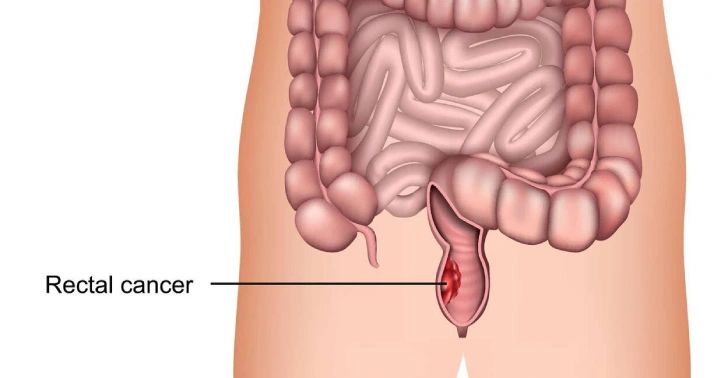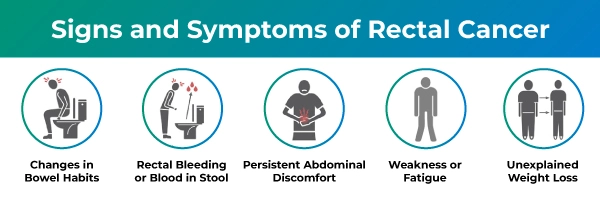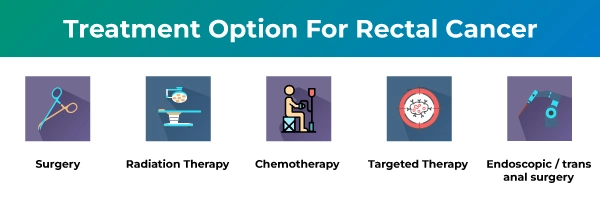- Home
- Rectal Cancer
Rectal Cancer

Rectal cancer is a type of cancer that develops in the rectum, the final part of the large intestine just before the anus. It typically begins as small growths called polyps, which can become cancerous over time.
Symptoms may include rectal bleeding, changes in bowel habits, a feeling of incomplete bowel movement, and unexplained weight loss. Early detection plays a crucial role in improving treatment success and long-term outcomes. If you are looking for a Rectal Cancer Specialist Ahmedabad | Dr. Ridham Shah offers expert diagnosis and advanced care to help manage and treat the disease effectively.
Rectal Cancer Specialist Ahmedabad | Dr. Ridham Shah brings extensive expertise in diagnosing and treating rectal cancer with a patient-first approach. He emphasizes regular screenings, timely diagnosis, and advanced treatment options tailored to each patient’s condition.
With a focus on compassionate care and evidence-based practices, Dr. Shah ensures that his patients receive the support and treatment they need throughout their journey to recovery.
Types of Rectal Cancer
Rectal cancer, a subtype of colorectal cancer, primarily forms in the tissues of the rectum — the final part of the large intestine. The types of rectal cancer are classified based on the type of cells from which the cancer originates. Here are the main types:
- Adenocarcinomas: This is the most common type of rectal cancer, accounting for about 95% of cases. Adenocarcinomas start in cells that produce mucus to lubricate the inside of the rectum.
- Gastrointestinal Carcinoid Tumors: These begin in the hormone-making cells of the intestine. They are relatively rare and typically grow slower than adenocarcinomas.
- Gastrointestinal Stromal Tumors (GISTs): GISTs are rare tumors that start in specialized cells in the wall of the gastrointestinal tract, known as the interstitial cells of Cajal. They can be found anywhere in the digestive tract, but it’s unusual for them to start in the rectum.
- Lymphomas: These are cancers of the immune system cells that typically start in lymph nodes, but they can also begin in the rectum or other organs.
- Sarcomas: Sarcomas can start in blood vessels, muscle layers, or other connective tissues in the wall of the rectum. Rectal sarcomas are rare.
Each type of rectal cancer has its own unique set of symptoms, diagnostic methods, and treatment strategies. It’s important to consult an oncologist if you experience any potential signs of these diseases for appropriate diagnosis and treatment.
Signs and Symptoms of Rectal Cancer
Rectal cancer may not present symptoms in its early stages. However, as the disease progresses, various signs and symptoms may emerge. Here are some key indications to watch out for:

- Changes in Bowel Habits
- Rectal Bleeding or Blood in Stool
- Persistent Abdominal Discomfort
- Weakness or Fatigue
- Unexplained Weight Loss
- Iron Deficiency Anemia
- Feeling that the bowel doesn’t empty completely
It’s important to note that these symptoms can also be caused by conditions other than rectal cancer, such as hemorrhoids, irritable bowel syndrome (IBS), or inflammatory bowel disease (IBD). However, if you experience any of these symptoms consistently, it’s crucial to consult an oncologist for a proper evaluation and diagnosis.
Causes of Rectal Cancer
Rectal cancer occurs when healthy cells in the rectum develop errors in their DNA. These errors cause the cells to grow and divide uncontrollably, forming a tumor. Over time, the cancerous cells can invade and destroy normal tissue and spread (metastasize) to other parts of the body.
While the exact cause of rectal cancer is not known, several risk factors are associated with its development:
- Age: Rectal cancer is more common in people over 50, though it can occur at any age.
- Diet: Diets high in red meat and processed foods have been linked to an increased risk of rectal cancer.
- Lifestyle Factors: Obesity, lack of physical activity, smoking, and heavy alcohol use can increase the risk of rectal cancer.
- Personal History: People who have had colorectal cancer, polyps in the colon or rectum, or inflammatory bowel disease (Crohn’s disease or ulcerative colitis) are at higher risk.
- Family History: Those with a parent, sibling, or child who has had colorectal cancer are at an increased risk. The risk is even higher if the relative was diagnosed when they were younger than 45, or if more than one first-degree relative is affected.
- Genetic Syndromes: Certain genetic syndromes passed through generations of a family can increase the risk of rectal cancer. These include familial adenomatous polyposis (FAP) and Lynch syndrome (hereditary nonpolyposis colorectal cancer).
- Radiation Therapy for Cancer: Radiation therapy directed at the abdomen to treat previous cancers increases the risk of rectal cancer.
It’s important to note that having one or more risk factors does not guarantee the development of rectal cancer. Many people with these risk factors never develop the disease, while others with no known risk factors do. Regular screenings are recommended, especially for those with high risk.
If You Notice Any of These Symptoms
Diagnosis of Rectal Cancer
Diagnosing rectal cancer typically involves several steps, each designed to confirm the presence of cancer and determine its size, type, and stage. Here are some common diagnostic methods:
- Physical Exam: This involves an oncologist checking for any abnormalities. He / She may perform a digital rectal exam (DRE), where a gloved, lubricated finger is inserted into the rectum to feel for any lumps or abnormalities.
- Fecal Occult Blood Test: This test checks for hidden blood in stool, which can be an early sign of rectal cancer.
- Endoscopy: There are two types of endoscopy procedures often used – sigmoidoscopy and colonoscopy. Both procedures involve a flexible tube with a camera at the end being inserted into the rectum to examine the rectum and colon. If abnormal tissues are found, a biopsy can be performed during the procedure to collect samples for further testing.
- Imaging Tests: Tests such as CT scans, MRI scans, ultrasound, and PET scans can provide detailed images of the rectum and surrounding structures, helping to determine the extent of the cancer and whether it has spread.
- Biopsy: A sample of tissue from the suspicious area is removed and analyzed under a microscope. A pathologist can determine if the cells are cancerous and, if so, the type of cancer.
- Molecular Testing of the Tumor: Some patients may have their tumor tested for specific genes, proteins, and other factors unique to the tumor.
- Blood Tests: Certain blood tests, including carcinoembryonic antigen (CEA) test, may help your oncologist understand your prognosis and guide your treatment.
The results from these diagnostic tests will help the oncologist develop an appropriate treatment plan. It’s important to discuss the results, risks, and benefits of each test with your oncologist.
Rectal Cancer Specialist Ahmedabad
The treatment of rectal cancer is complex and usually involves a multidisciplinary approach. The choice of treatment depends on the stage of the disease, the patient’s overall health, and personal preferences. Here are some common treatment options:

Surgery
This is the main treatment for all stages of rectal cancer. The goal is to remove the cancerous cells. Depending on the severity and location of the tumor, different types of surgeries may be performed, such as polypectomy (removal of polyps), local excision, total mesorectal excision (TME), and colostomy.
Radiation therapy
This uses high-energy rays (similar to X-rays) to kill cancer cells. It may be used before surgery (neoadjuvant therapy) to shrink the tumor or after surgery (adjuvant therapy) to kill any remaining cancer cells.
Chemotherapy
This uses drugs to kill cancer cells or stop them from dividing. Like radiation therapy, chemotherapy can be used before or after surgery. It is often used in combination with radiation therapy, a treatment known as chemoradiation.
Targeted Therapy
These drugs specifically target the changes in cancer cells that help them grow, divide, and spread. They can be used alone or in combination with chemotherapy or radiation therapy.
Endoscopic / trans anal surgery
For early stage rectal cancer , in select patients endoscopic or trans-anal surgical removal may be an option. Such intervention can avoid a major surgery and is advantageous in old age, poor health condition and high surgical risk patients.
Conclusion
Rectal cancer is a serious medical condition that requires immediate attention and comprehensive treatment. If you’re seeking expert care, consulting a Rectal Cancer Specialist Ahmedabad can make a significant difference in early diagnosis and successful management. Diagnosis involves various tests, including physical exams, endoscopies, imaging tests, biopsies, and blood tests. Risk factors for developing rectal cancer include inflammatory bowel disease, family history of cancer, certain genetic syndromes, lifestyle factors, and age.
A Rectal Cancer Specialist Ahmedabad provides tailored treatment plans that may include surgery, radiation therapy, chemotherapy, targeted therapy, or in some cases, active surveillance and ablation. It’s essential to have open discussions with your oncologist about the risks, benefits, and possible side effects of each treatment option. Regular screenings and early detection can greatly improve prognosis and long-term survival rates for rectal cancer.

Why Dr. Ridham Shah
A Surgical Oncologist Practicing In The City Of Ahmedabad
- Experience of a decade in treating cancer
- Expertise in Laparoscopic cancer surgery, Robotic cancer surgery
- Expertise in Digestive System Cancers, Colorectal cancers , Peritoneal cancers, advanced abdominal cancers
- Expertise in Cytoreductive Surgery, HIPEC, PIPAC
- Excellent support staff to help you during treatment
- 360 degree care
Specialities

Ovary Cancer

Rectal Cancer

Colon Cancer

Endometrial Cancer

Liver Cancer

Esophageal Cancer

HIPEC Surgery

Robotic Surgery

Vulvar Cancer

Gallbladder Cancer

Stomach Cancer

Pancreatic Cancer

Cervix Cancer
